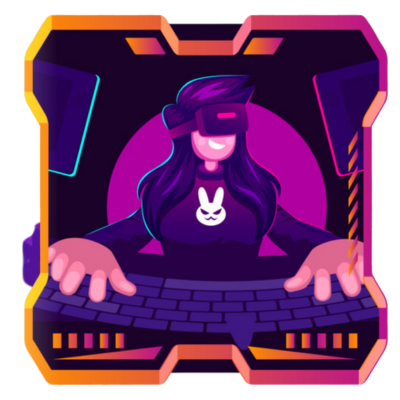Introduction
The landscape of online gaming is undergoing a seismic shift. Cryptocurrency, once a niche asset known only within tech circles, has breached the walls of virtual realms, embedding itself into gaming ecosystems and forever changing how communities form, trade, and engage.
The fusion of decentralized finance and digital worlds doesn’t just revolutionize the mechanics of games; it reshapes social dynamics, introduces new forms of governance, and unlocks economies that challenge traditional boundaries. Now, as the horizon of virtual worlds expands, gaming consoles stand at the forefront, poised to shape a future where cryptocurrency isn’t just a feature but a fundamental part of gaming life.
Level up to earn real rewards!
Our team of expert is on hand to assist you

The Evolution of Digital Economies: From Pixels to Real-World Value
Long before cryptocurrencies appeared in online games, virtual economies were already alive and kicking. Think of the early days—players trading coveted swords in Diablo II or hustling for gold in World of Warcraft. These weren’t just fictional coins; they carried real value, with players engaging in peer-to-peer trades that transcended game servers and spilled into real-world markets.
As gaming evolved, so did the sophistication of in-game economies. Titles like Second Life pioneered virtual marketplaces where players could create, buy, and sell digital assets using game-specific currencies that eventually found exchange rates against fiat money. Fast forward to today, and we find that cryptocurrency is now introducing a new paradigm: true asset ownership, powered by blockchain technology. With the assistance of a blockchain development company, game developers can now create decentralized economies where digital goods can be traded, sold, or even transferred across different games and platforms. What was once mere virtual goods have become assets with intrinsic value, held securely in digital wallets, bought and sold across global markets.
Shaping Social Dynamics Through Cryptocurrency Integration
Cryptocurrency has catalyzed significant changes in how gaming communities operate. With the advent of blockchain-based gaming, players can now own and trade unique digital assets (often represented as NFTs) outside the confines of any single game. This new-found freedom creates a landscape where game developers no longer dictate the economy; instead, players wield greater influence, forming decentralized marketplaces driven by supply, demand, and rarity.
For example, imagine a player owning a rare sword in a blockchain-based fantasy game. Rather than being locked to that specific game world, they can trade the sword on an external NFT marketplace development company platform, swap it for another game’s item, or sell it for real-world money. These shifts aren’t merely economic; they reshape community interactions. Players band together to form collectives, guilds, or even in-game corporations to strategize around these assets, lending the virtual worlds a social richness that parallels real economies.
However, with new opportunities come new forms of social stratification. As cryptocurrencies imbue assets with real-world value, a divide can emerge between those who can afford premium items and those who cannot, potentially creating social friction within communities that once thrived on skill and effort alone. To mitigate these issues, some communities have integrated smart contract development company services to ensure fair and transparent asset distribution among players, enhancing trust within decentralized gaming ecosystems.
The Gatekeepers of a Crypto-Infused Future
The evolution of gaming consoles has largely been about bringing cutting-edge experiences to living rooms worldwide. With powerful hardware, immersive graphics, and seamless connectivity, consoles are primed to be pivotal players in bringing cryptocurrency-based gaming into the mainstream. Major players like Sony, Microsoft, and even Nintendo are keenly observing the blockchain revolution, with some already experimenting with integrating crypto assets into their ecosystems.
But how exactly do consoles factor into this future? Consider the role of accessibility. Unlike PC gaming, which may require extensive setup, console gaming delivers a plug-and-play experience. Should consoles adopt blockchain-based wallets or marketplaces natively, millions of gamers could easily transition into crypto-infused experiences without navigating the complexities of blockchain technology. Moreover, with services such as crypto wallet development becoming more sophisticated, consoles can offer integrated digital wallets that allow for seamless cryptocurrency transactions and storage of in-game assets.
Consoles could further drive the adoption of Web3 game development services, where decentralized platforms and user-owned assets play a central role. The combination of Web3 capabilities and console gaming’s accessibility could democratize entry into the new digital economy, enabling a larger population of gamers to participate in the virtual asset economy.
Start earning while you game today!
Our team of expert is on hand to assist you

The Social Impact: New Opportunities, New Risks
With the integration of cryptocurrency in gaming comes a complex web of social effects. On the positive side, this new paradigm introduces novel opportunities for gamers to earn real-world income through play-to-earn models, creating digital entrepreneurs out of hobbyists. In emerging economies, where traditional job opportunities may be scarce, gaming can become a viable livelihood. Some players have even formed virtual cooperatives where earnings are pooled and distributed, demonstrating how gaming can foster collective economic empowerment.
On the flip side, the potential for speculative behavior introduces risks, particularly for younger or inexperienced gamers who may view cryptocurrency as a get-rich-quick scheme. Issues such as gambling addiction and financial loss are exacerbated when digital assets can be instantly converted to real money. Moreover, the infiltration of cryptocurrencies into online communities could lead to new forms of exploitation, where scammers and hackers target valuable in-game assets. These issues call for the development of more robust solutions, such as using token development services to create secure and tamper-proof digital currencies within games.
Despite these risks, many communities have embraced decentralized models, forming autonomous groups where players vote on in-game policies, changes, and even economic rules. Such governance models, driven by token-based systems, allow for democratic decision-making and reflect how deeply integrated these technologies have become in the social fabric of gaming. Companies specializing in DeFi development services are now collaborating with gaming platforms to implement decentralized financial models that align with the unique needs of gaming communities.
The Future of Virtual Worlds: Beyond Gaming
As cryptocurrencies and gaming merge, the very concept of a “game” is shifting. We’re no longer talking about isolated experiences that start and end with a title screen; we’re looking at persistent worlds that evolve and adapt based on players’ actions and economic trends. Here, blockchain isn’t just an add-on; it’s the foundation, allowing for true ownership, interoperability, and cross-game functionality.
With consoles leading the charge, the metaverse—a shared virtual space where digital interactions mirror real-world social and economic dynamics—is quickly approaching reality. The metaverse won’t be one game or one platform but rather an interconnected network of virtual worlds where players can seamlessly travel between experiences, bringing their digital assets and currencies along for the journey.
Moreover, the introduction of specialized services, like an NFT staking platform development company, adds depth to the gaming experience by allowing players to earn rewards through staking their digital assets, further blurring the lines between gaming and finance. Looking forward, one could foresee a scenario where virtual worlds surpass traditional social networks in terms of user engagement and economic activity. What began as entertainment will morph into fully-fledged digital societies where players can not only play but live, work, and influence. The future of gaming is less about the games themselves and more about the experiences, economies, and communities they foster.

Conclusion: Balancing Innovation with Social Responsibility
The infusion of cryptocurrency into online gaming represents a significant cultural and technological shift, with consoles at the forefront of this revolution. While the benefits are substantial, including new economic opportunities, community empowerment, and immersive virtual experiences, so too are the challenges. Financial risks, regulatory issues, and social inequalities may arise as this technology continues to evolve.
Ultimately, the gaming industry, regulators, and players themselves will need to navigate this rapidly changing landscape thoughtfully, ensuring that innovation does not come at the expense of social responsibility. The social impact of cryptocurrency in online gaming communities is profound, yet its story is still being written, with the next chapter likely to unfold on the very consoles that have been a constant companion in every gamer’s journey.



